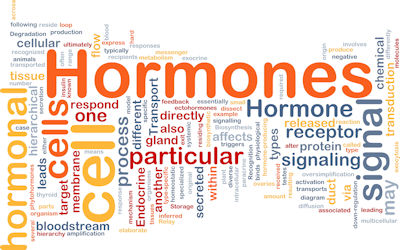

Testosterone, women, and fibromyalgia? Could a male hormone -or the lack of it – be causing trouble in FM? The primary male sex hormone, testosterone promotes the growth of the male sex organs and helps produce the increased muscle, bone mass, body hair, and deeper voices seen in men.
Testosterone may be responsible for many features associated with males but it’s also secreted in small amounts by the adrenal glands and the ovaries in females. While males produce and use about 20’s the testosterone that females do, females are actually more sensitive to the hormone. Women receive a spike in testosterone – not estrogen, but testosterone – endorphin and oxytocin levels, after intercourse.
The researchers of these two papers assert FM is an inflammatory nervous system disorder – and they believe testosterone plays a role in that inflammation.
A novel use for testosterone to treat central sensitization of chronic pain in fibromyalgia patients. Hillary D.White, Thomas D. Robinson. International Immunopharmacology xxx (2015) xxx–xxx
Treatment of pain in fibromyalgia patients with testosterone gel: Pharmacokinetics and clinical response. Hillary D. White, Lin A.J. Brown, Robert J. Gyurik, Paul D.Manganiello, Thomas D. Robinson, Linda S. Hallock, Lionel D. Lewis, Kiang-Teck J. Yeo. International Immunopharmacology xxx (2015) xxx–xxx
The authors propose several mechanisms by which low testosterone might affect pain sensitization in fibromyalgia. They note that stressful situations usually reduce pain sensitization but that the opposite tends to occur in ME/CFS and FM.
A factor called substance P in the spinal cord usually, during stress, stimulates an enzyme (aromatase) that converts testosterone to estradiol. Estradiol then upregulates endogenous opioid production which in turn increases our tolerance of pain. The authors propose that low testosterone levels in FM and associated disorders prevent this from happening fully. They reported that several studies indicate that low testosterone levels are present in FM
In fact, they suggest that this inhibition of that inhibitory pain response allows the pain sensitization process to ramp up higher and higher: the outcome – instead of pain going down during stress it increases.
Faulty pain inhibition is increasingly being seen as a critical factor in FM. It seems that failed inhibitory processes are present across several systems in FM and ME/CFS. The vagus nerve may not be toning down the sympathetic nervous system. Microglial inhibiting factors may not be kicking in to stop them from over-activating. Activating under performing inhibitory processes may end up being key for treating these disorders.
The Multiple Sclerosis Connection
Fibromyalgia is not the only “women’s disorder” testosterone levels are being examined in. Testosterone’s effects in multiple sclerosis are getting significant study. A recent review of hormonal related changes in MS asserted that there is “compelling evidence that estrogen, progesterone, and testosterone control MS pathology by influencing immune responses and by contributing to repair mechanisms in the nervous system”.
A recent study suggested lower testosterone levels in men with multiple sclerosis are associated with greater disability. Another found a high association between reduced testicular functioning and the onset of MS in men.
Some similar findings have been found in women. Women with MS tend to have lower testosterone levels, and increased lesions were associated with reduced testosterone levels in one study.
Testosterone may be more than protective; it may even have reparative factors. Testosterone treatment repaired damaged myelin in both male and female mice in an MS mouse model (autoimmune encephalomyelitis). The study suggested an androgen receptor on the nerves plays a critical role in myelin repair.
A very small clinical trial suggested testosterone supplementation might be able to increase white matter volume in the brains of men with MS. If that finding is validated in larger studies, testosterone might be the first substance found that can reverse some of nervous system damage found in MS.
The Study
The authors tested out their hypothesis in a small, non-placebo controlled (12 person) pilot study that examined efficacy and safety of a transdermal testosterone gel a company they are associated with manufactures. (They propose this gel provides more effective release across time than other gels). All the participants were white females between the age of 40 and 55.
The gel was applied to the abdomen once a day. The amount of testosterone provided was modulated to produce just above normal blood testosterone levels. Hormone levels were monitored in ten blood draws the first day and ten draws on the last day of the month-long study.
A questionnaire based on the Fibromyalgia Impact Questionnaire (FIQ) measured muscle pain, stiffness, fatigue upon awakening, tiredness, libido, depression and anxiety. Visual analogue pain scale and tender points rounded out the symptom testing portion of the trial.
Testosterone concentrations were determined by an immunoassay able to detect the lower testosterone levels in women.
Results
The test revealed the blood testosterone levels of the women entering the study were in the lower half of the normal reference range for their ages. Using the gel normalized and slightly increased their testosterone levels to just above the reference range.
A third of the women reported a 50% or greater decrease in pain. Forty-two percent were reported to have a 33% or greater decrease in pain. Tender point sensitivity was significantly reduced. Libido was significantly increased. The treatment had no effect on headache severity, sleep, anxiety or depression.
The very small size of the trial and the lack of placebo controls undermined the ability to assess the effectiveness of the gel. The trend, however, was in the right direction.
Treatment
Testosterone treatment is somewhat controversial. The authors reported that the American Society for Reproductive Medicine’s Princeton Consensus Statement recommends treating women with gonadal hormones, if clinical symptoms such as diminished sense of well-being and chronic fatigue are present. The North American Menopause Society recommends treatment for symptoms of decreased sexual desire, if blood monitoring is done. The Endocrine Society advises against androgen therapy in healthy women.
Findings suggesting that negative cardiovascular events may be associated with testosterone replacement therapy in older men lead the FDA to stop a testosterone trial. Increasing the growth of pre-existing prostate cancer is another concern. It may also exacerbate sleep apnea.
Several alternative MD’s reportedly use testosterone successfully in some of their FM and ME/CFS patients.
Wrapup
The very high rates of gynecological disorders found in ME/CFS suggest female hormones play a role. They may not be the end of the hormonal story in fibromyalgia and ME/CFS.
Broderick’s models suggest women may be more susceptible to ME/CFS because they don’t have large amounts of testosterone coursing through their systems. Low testosterone levels, on the other hand, may increase men’s susceptibility to some disorders. Imbalances in both hormones may, in the end, contribute to fibromyalgia and ME/CFS.
If testosterone treatment ends up becoming part of the standard FM treatment protocol it will surely, like other therapies, be one part of a multi-dimensional treatment protocol: not a cure – but a help.










Ive been asking men that have CFS, FMS and POTS if they have had the balance between testosterone and estrogen checked. May not be that it is low – but estrogen could be to high and throw the balance off. Its hard to get docs to check a mans estrogen levels. But it may be worth checking.
Some of us women have had issues that connect to hormone imbalance. Reasons that men would too.
Issie
Yes, makes sense that men may have an imbalance between testosterone and estrogen (low testosterone, high estrogen). For women, estrogen at least, when it is not opposed by a very large concentration of progesterone, creates all of the conditions known to be involved in the aging process. According, to Dr Ray Peat males often have as much estrogen as females, especially when they are tired or sick.
Source: http://raypeat.com/articles/hormones/h1.shtml
I have been taking hormone supplements and added testosterone 6 months ago. I do feel it helps. Not a miracle cure, far from it. But it helps a little- and a little is a lot to me.
Find this really interesting and possibly confirming my thoughs on the matter.
I have been thinking about the logic of it all- this being “woman”-diseases, and the connection between low testosterone and pain.
looking forward to see more studies/information in time on this issue.
forgot to mention, I have fibro and ME/cfs. Is there anyone who knows how to remove my picture from this posts?
As a male with Fibromyalgia since before year 2000 and then contracting Epstein Barr Virus in 2008 and then being diagnosed with Chronic Fatigue Syndrom and now my younger brother who is 54 just been diagnosed with Fibromyalgia and possibly Chronic Fatigue Syndrom we both have been receving Testosteron Treatment Thearpy and yes it helps but does not fix it.During the first year of treatment it was very hard getting the right dose and trying to get regulated.My brother and i must have to keep our level in the high range or we end up in bed with higher levels of disability and fatigue and all over joint and muscle pain and more exasterbated brain fog and more mucle stiffness and weekness.Testosterone treatment helps but does not fix the disease.
My Endocrinologist Dr Halasz who also has Chronic Fatigue Syndrom and my primary care physician here in Southwest Florida has been treating me with increased B-12 injection thearpy 3 times week along with Testosterone shots twice monthly,along with 3 -20 mg Amphetamine Salt Combo,Levothroxine for endocrine,B-12 1000 mg,CQ-10 100mg,Super B Complex,and Multivitamines.I also requested my doctors to start me on Benicar after reading The Autoimmunity Reasearch and The Marshal Protocol.
Has anyone tried the Marshal Protocol and if so have any improvement?
Thanks for relating your experience and good luck. I’ve heard mixed reports on the Marshall Protocol but perhaps others have direct experience with it.
I think fibromyalgia is other name for chronic fatigue syndrome
No; Chronic Fatigue Syndrome is the other name for ME (Myalgic Encephalomyelitis). Fibromyalgia (FMS) is diagnosed as a different illness, despite the similarities.
I’m a man with fibromyalgia and when I got my testosterone tested it was on the high side of normal. I’ve never had my estrogen tested so I can’t comment on that.
This whole study sounds fishy to me. Isn’t it normal for people who can’t exercise much (ie. fibromyagia patients) to have low testosterone?
And increasing testosterone levels for even ordinary people increases their stamina , right?
By the high side of normal do you mean above 600 ng/dL? The total testosterone range for men 20-50 years is approximately 250-840 ng/dL, which is quite a span. (Over 50, about 200-740, mean 470) If your level is 300 ng/dL you are low normal. Some would call this the high side of normal, as in high side of low normal, others might say borderline low.
I have been taking oestrogen, progesterone and testosterone for 5 months and I can say that the following symptoms have gone or decreased; fatigue, muscle pain, all over pain and flu type symptoms, brain fog, inability to exercise, and a reduction in pain sensitivity. I feel more clear headed, less depressed, less moody, less aggressive, and I feel more creative. Oh, and my sexy drive and insomnia has improved!! I am 45 and female. This has been the only treatment that has worked for my Fibro.
Is ur endo treating you, i see my endo next month and was curious re: which MD is prescribing
in what form ? and what dose? or is it specific to pre existing levels? if the latter, how do we get tested?
What is the dose of testosterone gel woman take?